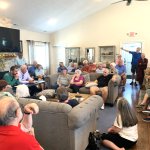Driving down from Rittenhouse Square recently with husband John, I could not wait to get to Stone Harbor Boulevard to feel the warm, damp wetland air on a post-summer evening. It had been a busy week seeing psychotherapy clients back from summer vacation. It would be a busy Saturday in the Stone Harbor office, where a couple is working with issues of life and death, and a family is terrified by the outbreak of a pre-teen daughter.
We slid into our Wetlands Institute neighborhood just after darkness and unpacked two black velvet Portuguese water dogs with tails wagging wildly at the thought of being able to run a bit before bedtime.
We noted with relief that the recent storm warnings around the time of Hurricane Hermine led to no real damage for our cottage or boats.
Groceries stored safely in the fridge, I walked to the end of our fenced-in dock and took three deep breaths: with the first breath I established a deep and slow breathing rhythm. With the second breath, I welcomed the soft breeze that cooled the heat and humidity of the day. With the third, I drank in the beauty of window boxes filled with red Mandeville to my right, and the vast expanse of night on the heather green fall marshland before me.
Oakley, my 45-pound canine imp, pranced next to me before taking off into a heated run back and forth and back and forth, running out tension from being cooped up in the city for four days. I stood in stillness, drinking in the tranquility and freshness of my watery backyard, feeling unburdened and renewed from the pace of the week. My shoulders dropped into a resting state.
Exhausted, I spoke with a very worried mother who was desperate to reach help and had tried to reach me for 48 hours, and then collapsed into bed. Dreamily, I anticipated awakening to a misty marshland morning.
And sure enough, at 5 a.m. I peeked through our blinds to feel the total stillness of the early morning on the marshlands. The Intracoastal Waterway, two doors from our cottage, provided barely a ripple at low tide. Tall marshland grasses were mirrored in the channel water in front of me. It looked as humid as it felt.
I sat to write this column entry at our table which provides us with full view of the marsh. As the mist lifted, the profound stillness of the marshes was interrupted only by a very occasional bird flying slowly in search of breakfast. Now, this column entry finished, I feel centered, peaceful, and ready for a day of business and biking.
We often overlook wetlands. They are our modest and powerful silent partner. These complex habitats act as giant sponges, soaking up rainfall and slowly releasing it over time. Wetlands are one of the most undervalued ecosystems:
1. They provide food; they filter water and offer a unique habitat for many different species.
2. Coastal wetlands soften damage from hurricanes in the United States and create billions of dollars of storm protection services annually.
• The wetlands around New York City save billions of dollars on new wastewater treatment plants by purifying the water supply for free.
• In the Caribbean, coral reefs created billions of dollars of shoreline protection services. Wetlands contribute in no small way to our quality of life – indeed, to our very survival.
• Wetlands are like highly efficient sewage treatment works, absorbing chemicals, filtering pollutants, and sediments, breaking down suspended solids and neutralizing harmful bacteria
• Wetland ecosystems create useful products like fish, rice, and reeds for making mats.
Later today we will climb into our Carolina Skiff and skim across the water as we delight in the recreational value of our marshy home. Perhaps I will jump into the clean and rippling water at high tide today. But my favorite of all the resources the wetlands provide us will be all too evident any week now, as we look out our back door and have an orchestra seat to the most extraordinary mass movement of any living creature on Earth – the annual migration of countless birds over vast distances.
My backyard offers them protection and food on their way to the warm. And they will return next spring. You can be sure of it.
To Consider: When is the last time you took a bike or car to visit Benny’s Landing or the Wetlands Institute to honor and learn about the remarkable marshlands that surround us? Might this week be a good time?
To explore: The worldwide federation on the ecology of the wetlands…. http://wwf.panda.org/about_our_earth/about_freshwater/intro/value/
Dr. Judith Coche can be found in her Stone Harbor or Rittenhouse Square office, where she does clinical work with individuals of varying ages, couples, families, and groups. Reach her through www.cochecenter.com.








